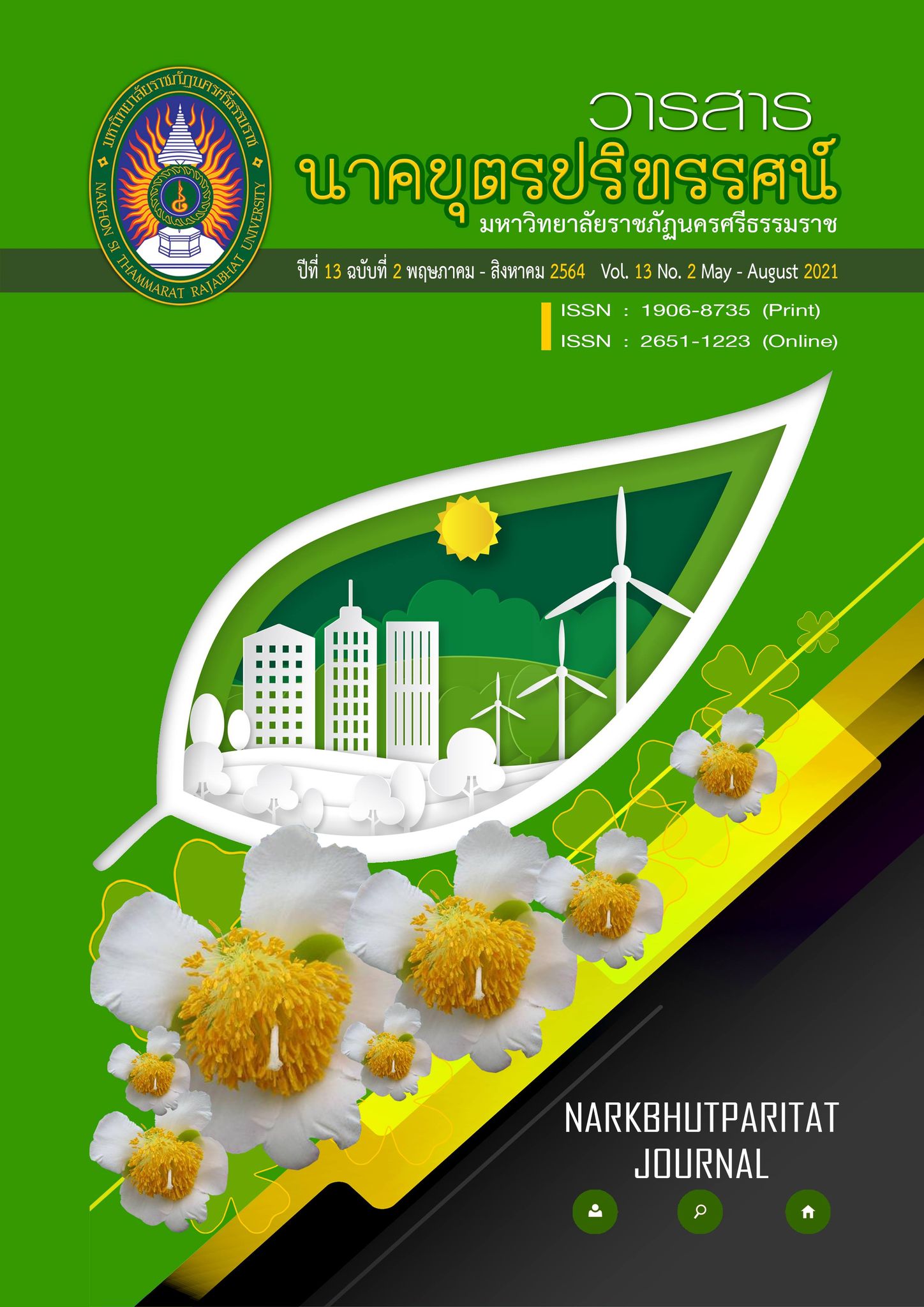บทบาทการเป็นตัวแปรคั่นกลางของสมรรถนะหลักและสมรรถนะเฉพาะตำแหน่ง ที่มีต่อความสัมพันธ์ระหว่างปัจจัยองค์การกับการปฏิบัติงาน ประกันคุณภาพการศึกษาในมหาวิทยาลัยราชภัฏกลุ่มภาคใต้
Main Article Content
บทคัดย่อ
การวิจัยครั้งนี้มีวัตถุประสงค์เพื่อศึกษาบทบาทการเป็นตัวแปรคั่นกลางของสมรรถนะหลักและสมรรถนะเฉพาะตำแหน่งที่มีต่อความสัมพันธ์ระหว่างปัจจัยองค์การกับการปฏิบัติงานประกันคุณภาพการศึกษา ในมหาวิทยาลัยราชภัฏกลุ่มภาคใต้ กลุ่มตัวอย่างเป็นบุคลากรที่ปฏิบัติงานประกันคุณภาพการศึกษาในมหาวิทยาลัยราชภัฏกลุ่มภาคใต้ ประจำปีการศึกษา 2558 จำนวน 474 คน ซึ่งได้มาจากวิธีการสุ่มกลุ่มตัวอย่างแบบแบ่งชั้นภูมิ (Stratified Random Sampling) โดยใช้หน่วยมหาวิทยาลัย 5 ราชภัฏกลุ่มภาคใต้เป็นหน่วยในการสุ่ม แบบการวิจัยที่ใช้เป็นวิธีการเชิงปริมาณ (Quantitative Method) เพื่อตรวจสอบบทบาทการเป็นตัวแปรคั่นกลางของสมรรถนะหลักและสมรรถนะเฉพาะตำแหน่งที่มีต่อความสัมพันธ์ระหว่างปัจจัยองค์การกับการปฏิบัติงานประกันคุณภาพการศึกษาในมหาวิทยาลัยราชภัฏกลุ่มภาคใต้ เครื่องมือในการเก็บรวบรวมข้อมูลคือ แบบสอบถามมาตราส่วนประมาณค่า 5 ระดับ สถิติที่ใช้ในการวิเคราะห์ข้อมูล ประกอบด้วย สถิติพื้นฐาน ได้แก่ ค่าสถิติ ค่าเฉลี่ย ค่าส่วนเบี่ยงเบนมาตรฐาน ค่าสูงสุด ค่าต่ำสุด ค่าความเบ้ ค่าความโด่ง ค่าสัมประสิทธิ์สหสัมพันธ์เพียร์สัน และสถิติที่ใช้ในการทดสอบสมมติฐาน ซึ่งในครั้งนี้ ผู้วิจัยได้ใช้การวิเคราะห์สมการโครงสร้าง (Structural Equation Modeling: SEM) โดยการวิเคราะห์เส้นทาง (Path Analysis)
ผลการวิจัยพบว่า บทบาทการเป็นตัวแปรคั่นกลางของสมรรถนะหลักและสมรรถนะเฉพาะตามลักษณะงานที่ปฏิบัติ พบว่าทั้งสองตัวแปรมีบทบาทการเป็นตัวแปรคั่นกลางบางส่วน (partial mediation) เนื่องจากทั้งตัวแปรภาวะผู้นำการเปลี่ยนแปลง (LS) การมีส่วนร่วม (PC) และการจัดการขององค์การ (OG) นอกจากจะส่งผลทางอ้อมผ่านสมรรถนะหลักและสมรรถนะเฉพาะตามลักษณะงานที่ปฏิบัติแล้วยังส่งผลโดยตรงต่อการปฏิบัติงานประกันคุณภาพ จึงกล่าวได้ว่าสมรรถนะเฉพาะเป็นตัวแปรสำคัญในการเชื่อมต่อระหว่างภาวะผู้นำ การมีส่วนร่วม และการจัดการองค์การไปยังการปฏิบัติงานประกันคุณภาพมากกว่าสมรรถนะหลัก แต่ข้อสรุปนี้ไม่ได้หมายความว่าสมรรถนะหลักไม่สำคัญ เพียงแต่สำคัญน้อยกว่าเท่านั้น
Article Details
เอกสารอ้างอิง
Boonyamanee, T. (2017). Leadership and Transformational change. Bangkok: Odeanstore
(in Thai)
Gutner, T. & Adams, M. (2009). A Leadership Prescription for the Future of Quality (Research Report). New York: The Conference Board.
Horton, S. (2000). Introduction: The Competency Movement: Its Origins and Impact on the Public Sector. International Journal of Public Sector Management, 13 (4), Retrieved 2015, January 12, from https://doi.org/10.1108/09513550010350283
Intarakamhang, A. & Thongpakdee, T. (2017). Study of the development of the leadership competency model Academic of faculty members in public, private and autonomous universities. Bangkok: Graduate School Srinakharinwirot University. (in Thai)
Janbunjong, C. (2015). Management Psychology. Research Journal Naresuan University, 5(2), 1-9 (in Thai)
Krobbuaban, B. (2016). Core Competency and approaches to development principles The service of Chaiyaphum Hospital. Graduate School. Chaiyaphum Rajabhat University. (in Thai)
Kangpeng, S. (2000). Administrative Factors Influencing School Effectiveness : Development And the integrity of the model. (Doctor of Philosophy Thesis). Khonkan University, Education Degree philosophy Educational Administration Branch College. (in Thai)
Manz, C. & Sims, H. (1991). Super Leadership: Beyond the Myth of Heroic Leadership. Retrieved 2015, January 30, from https://doi.org/10.1108/09513550010350283 https://doi.org/10.1016/0090-2616(91)90051-A
Na Nan, R. (2017). Core Competency Chief Administrator of the SAO in Nan. Graduate School of Chiang Mai University. (in Thai)
Office of the Civil Service Commission (2005). Deployment of competencies in human resource management. In Competency of government officials. Bangkok: Office of the Civil Service Commission. (in Thai)
Richard, M.D. & Greenlow, P.S. (1961). Managenent and Decision - making.Home Wood. Richard D: Irwin Inc.
Russamethammachot, S. (2008).Human resource management cook book. Bangkok: Thailand Productivity Institute. (in Thai)
Russamethammachot, S. (2011). Talent management by competency-based career development and succession planning. Bangkok: Thailand Productivity Institute. (in Thai)
Shippmann, F. S. et al. (2000). The practice of competency modeling. Personnel Psychology, Michigan, 53, 703-740.
Thongsamsi, K., & Trichan, C. (2013). The development Process of Functional Competencies of Quality Assurance Officers in Public Higher Education Institutions in Thailand. Rajamangala University of Technology Srivijaya. 5(1), 47-60. (in Thai)
Vetchayanon, N. (2009). Competency model and application in Thai organizations. Bangkok: Graphico Systems. (in Thai)
Waddell, D. & Stewart, D. (1999). The Personal and Professional Development of Quality Manager. Working Paper 02/99. Department of Management, Monash University, Melbourne.


